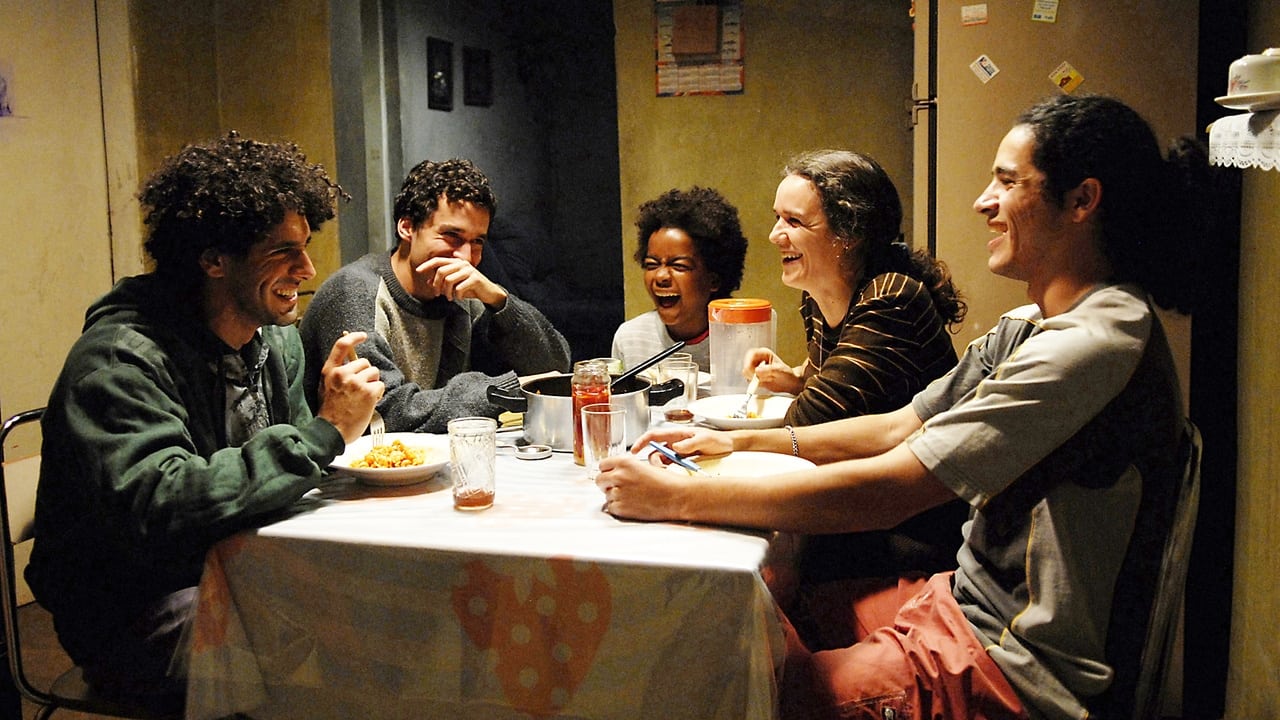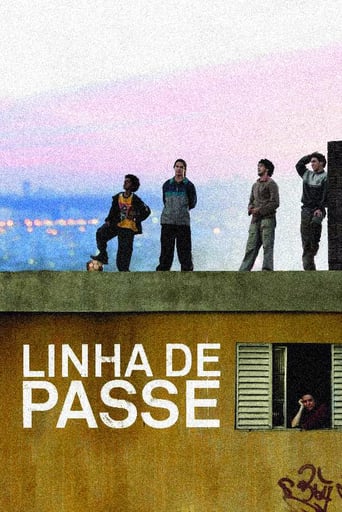

Thanks for the memories!
... View MoreThere is just so much movie here. For some it may be too much. But in the same secretly sarcastic way most telemarketers say the phrase, the title of this one is particularly apt.
... View MoreIt’s fine. It's literally the definition of a fine movie. You’ve seen it before, you know every beat and outcome before the characters even do. Only question is how much escapism you’re looking for.
... View MoreAll of these films share one commonality, that being a kind of emotional center that humanizes a cast of monsters.
... View MoreSet in São Paulo, Brazil's largest city, this film follows the lives of one family. This family consists of single mother Cleuza, who works as a cleaner for a middle class family, and her four sons, by different fathers; Dario, who dreams of making it as a football star; Dênis, who works as a motorcycle courier; Dinho, a born again Christian who works and a local petrol station and helps at the church he attends; and Reginaldo, who travels around on the city's buses hoping to find his father. There is no plot as such; we just observe each of them as they live their daily lives and try to achieve their personal goals.As I started watching this I knew nothing about the film so had no real idea of what to expect. Early on I was waiting for 'something to happen' but not much does till quite near the end and even then most of the questions raised aren't answered. That might frustrate some viewers but I gradually felt myself drawn into the characters' lives. Directors Walter Salles and Daniela Thomas do a fine job keeping everything very real... for example a motorbike pursuit through the city's busy streets feels more real, and thus more dangerous, than more extreme chases featuring obvious stunts and set-pieces. The cast are equally impressive so it feels as though we are watching their lives not watching people act. Overall I'd say this won't be for everybody but if you want a solid character lead film this is well worth checking out.These comments are based on watching the film in Portuguese with English subtitles.
... View MoreSalles never disappoints, and his film "Linha de passe" is no exception. The movie tells the story of a middle class mother raising four boys in a large and unforgiving neighborhood in São Paulo, Brasil. Unlike Salles' most famous movies, "Linha de passe" does not tell a story of a hero or of a dramatic and impressive story of people overcoming extreme circumstances. It is a pure and undramatized story of a single-parent family just "getting by." The acting is believable to the point it is difficult to imagine the actors as anyone else but their characters. The writing is impressive, with five stories depicted and developed yet there is an amount of inconclusiveness left up to the imagination of the audience. It seems as though this story was received by Brazilians as being true and honest to what a picture of the typical life of a family in Brazil. As an American, I appreciated the apparent authenticity of the movie as shown through the excellent cinematography and writing. I would definitely recommend this movie.
... View MoreWalter Salles's first Brazilian feature film since "Abril Despedaçado/Behind the Sun" (2001), "Linha de Passe" -- in which he shares direction credit with Daniela Thomas for the seventh time -- is a contemporary neo-realist essay that confirms Salles's humanist concerns. In these our times of cynicism, nihilism or downright pessimism, Salles's unbending belief in compassion, resilience and man's intrinsic goodness might seem naive or filled with Christian piety. But he's no preaching Pollyanna: he looks up to the great humanist filmmakers (Renoir and Rossellini on top) yet he never compromises in cheap schmaltz, happy-go-lucky naiveté or Hollywoodized feel-good endings.Inspired by the insightful TV documentaries co-directed by Walter's younger brother João Moreira Salles, "Futebol" (1998 - revealing some of the shady business/management practices in Brazilian professional soccer) and "Santa Cruz" (2000 - about the sweeping spread of Protestant cults in Brazil, especially among the poor), "Linha de Passe" takes the structure from Visconti's "Rocco and his Brothers" -- a mother raising four sons striving for dignity and a better life in a big, oppressive city -- and transposes it to an ugly, lumpen neighborhood (Cidade Líder) in the outskirts of São Paulo. The family is poor, not destitute: they belong to the working-class that's near-bottom but not quite. Forty-something house- cleaner Cleuza is pregnant with her fifth child (we never meet the fathers). Her four sons are teenagers Dinho, a gas station attendant who joins a Pentecostal cult in his search for purity of body and soul; sly Dênis, a motorcycle courier whose desperate need for money to help raise his baby son (he's separated from the boy's mother) and pay for his bike leads him to crime; closed-in Dario, who at 18 may already be too old to pursue his dream in professional soccer; and super-smart pre-teen Reginaldo, whose black skin makes him an outcast even in his own family, as he obsessively goes for bus rides in search of his unknown bus-driver father.The plot, structure and dialog may seem occasionally déjà vu, and the screenplay (by co-director Thomas and TV-writer George Moura, with "City of God"'s Bráulio Mantovani's "collaboration") doesn't quite succeed in developing the five individual stories with equal creativity and strength (Dinho's thread is the best, Dênis's the most contrived). Clichés surface whenever middle- and high-class characters are involved. And, as usual with Salles, water symbolisms abound: the rain, the soul-cleansing shower scene with Dinho and Dario, a baptism in the lake, culminating with a maddeningly obvious clogged sink, symbolizing the "clogged" lives of the characters.Despite all that, there's a LOT going for "Linha de Passe". The setting and locations are among the film's finest qualities: away from the over-explored favela environment and its usual combo of guns, drugs and violence, the film focuses on one often overlooked geographic and social landscape of Brazil's class structure. It's also a miracle of casting, from the right physiognomies (the five protagonists really look like they share DNAs) to the careful attention for accent-nailing, something very rare in Brazilian films (actors from different parts of Brazil speak with accents typical of São Paulo's periphery). Their performances are dazzling, especially when you consider that, excepting Vinícius de Oliveira (Dario), they're all feature film first-timers. Sandra Corveloni, surprise winner of 2008 Cannes Best Actress Award for her role, is the spine of the film as the weather-beaten, end-of- the-rope mother trying to hold her crumbling family together. The four boys are impressive, but José Geraldo Rodrigues is simply stunning as soul-searching Dinho: he's a seriously talented actor (it's also the best, richest role).Salles's tone is, as usual, melancholy but never maudlin; he's too classy to stoop to audience manipulation. He's found in D.P. Mauro Pinheiro ("Cinema Aspirinas e Urubus") the ideal cameraman for this film, away from the beautifying images that compromised parts of his other films -- the imagery here is dry, desolate, akin to some of the best recent South American movies by Lucrécia Martel, Pablo Trapero or Pablo Stoll. The emotional power comes out of staring at "real" people in real locations, in the best neo-realist tradition (the scenes at the soccer stadium are especially compelling). The carefully planned editing fully succeeds in keeping the 5 stories alive and interconnecting in fine rhythm. Gustavo Santaolalla's spellbinding, deceptively simple music proves once again that he -- more than any other contemporary film composer -- owns the secret key to open hearts and minds without ever sounding obtrusive, overblown or mawkish."Linha de Passe" wisely and democratically offers "open" denouements for each character's thread: it's OUR job to come up with the conclusions, and they'll depend on our (in)ability to believe there's still light at the end of the tunnel (for some of the characters, at least). But Salles+Thomas's affirmative position comes clearly in the shape of the closing credits' song: the classic samba "Juízo Final" by Nelson Cavaquinho ("The sun will shine once more/ Light will reach the hearts/ The seed of evil will burn out"). It's the same song that we heard at the closing credits of Jorge Durán's moving humanist manifesto "Proibido Proibir" (2007). It's no "coincidence": the song is there, as it was in Durán's film, because -- if we're ANY human -- we leave the theater feeling that, unlike the tons of junk movies which desensitize us in the name of "entertainment", we've just seen a film that ACTUALLY has urgent, important things to say. And says it sensitively, insightfully, poignantly.
... View MoreWalter Salles and his longtime partner Daniela Thomas come at their best with 'Linha de Passe'. After shooting Dark Water (which I haven't seen but only heard bad things about it) and the predictable Motorcycle Diaries, Salles focused on his best ability: showing the real Brazil to the world and - even more important - to Brazilians themselves. The acting is so accurate that sometimes the movie looks like a documentary about people who strive to have a decent life despite living in a poor suburb in São Paulo. Not only Sandra Corleoni - who won the Palme d'Or - is brilliant, but nearly everyone, even the characters who are not so much in evidence. I would say that this the movie captures the contradictions of the urban Brazil in such a profound way that it leaves you with little else to talk about the subject. Although each character kind of represents a particular stereotype of Brazilian people, there's so much subtlety in each of them (because of the screenplay and the acting) that the plot sounds completely natural, which doesn't happen with 'Crash', the awarded American movie that 'Linha de Passe' reminds me of. In my opinion, Salles' masterpiece is still 'Behind the Sun' (Abril Despedaçado), but if a foreigner asked me to explain what's to be Brazilian, i would suggest him to watch this movie.
... View More